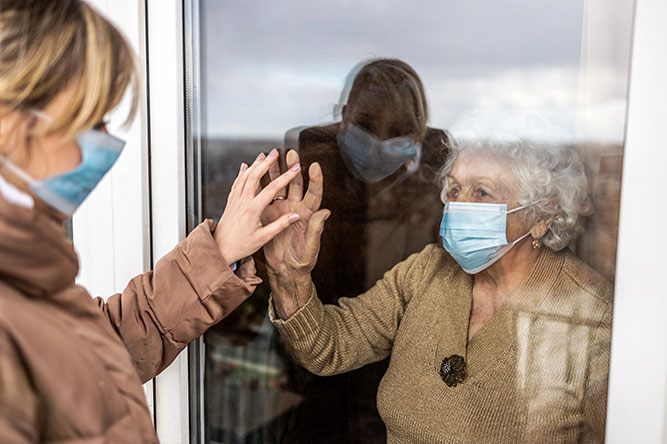
While vaccines and antiviral therapy have made a vast difference in our ability to protect against and treat COVID-19, the lingering effects of isolation and anxiety have no doubt left an indelible scar on the elderly population. During the COVID-19 pandemic, there has been a “significant increase of mental health conditions in older adults due to the snowballing effects of social isolation leading to trauma, anxiety, and depression.”[1] Although technology played an important role in connecting seniors with their families and loved ones at the onset of the pandemic, continued efforts need to be made to improve the mental health of the elderly as we enter new stages in an ever-evolving situation.
Impact of COVID-19 Lockdown on Seniors
At the onset of the COVID-19 pandemic, lockdowns and social distancing were necessary to protect everyone—especially the elderly—from an unknown virus. Senior living isolation protocols and the suspension of visitation of family and friends were established. At this point in the pandemic, seniors account for 75 percent of deaths from COVID-19 in the U.S.[2] Although isolation was crucial in protecting our most vulnerable population, we have also learned that doing so reduced cognitive stimulation, reduced physical activity, and increased anxiety and depression symptoms.[3]
Factors that contributed to the increase of anxiety in seniors during the lockdown included:[4]
- Demographics: disparities based on sex, age, and race
- Socioeconomic status: financial resources and education levels
- Living situation: living alone or co-habiting, as well as climate effects on mood and memory
- Pre-existing mental health conditions: exacerbation and increased levels of anxiety
In addition to anxiety around contracting the virus, loneliness was also associated with increased activation of the sympathetic nervous system, which can result in “hypertension, inflammation, and elevated stress hormone levels.”[5]
Current State of Senior Living During a Continuing Pandemic
While much of the world has reopened since the start of the pandemic, there are still COVID-19 outbreaks within senior living communities that require strict quarantine protocols. The availability of vaccines and antiviral therapy has made an incredible impact on protecting seniors, but the COVID-19 virus is continuously evolving.
Currently, the Omicron variant is proving to be more contagious and more capable of evading immunity from vaccination or past infection. While Omicron is typically milder in its severity, it is still capable of causing severe disease in the elderly population. Data shows that the number of Americans age 65 and older who died in four months from the Omicron surge was almost the same as those who died from the Delta surge in six months.[6]
Although many refer to our current state as “post-pandemic,” evidence points to COVID-19 possibly becoming endemic within the next two years.[7] With the continued existence of COVID-19 and its impact on the communities we serve, a sustained emphasis on improving mental health for the elderly is paramount.
Recommendations for Addressing and Improving Mental Health for Seniors
As the world slowly shifts toward the endemic phase, it is important to acknowledge the fact that we are still experiencing a pandemic in which our most vulnerable population is at risk. Seniors will continue to need emotional and mental support beyond the pandemic, but thankfully, there are several ways we can continue to support them:
- Encouraging socialization: Although some residents have embraced the ability to reconnect with those around them, others have struggled with months of isolation. Compassion and understanding—along with gentle encouragement—can help increase participation in social activities.
- Accessing mental telehealth: For those hesitant to venture far from their rooms, consultations and counseling in a virtual environment is a great way to support seniors with anxiety and depression in a safe space.
- Immersion with nature: Research shows that interaction with nature can help reduce anxiety and stress.[8] For those without access to outdoor spaces, indoor natural elements and virtual interactions with nature sounds and visuals are effective means of bringing nature to your residents.
- Listening: This is one of the most basic tools we have at our disposal. Compassion and understanding are key in showing we care and value the individuality of everyone in our communities.
Addressing and improving mental health in seniors—during a continuing pandemic and beyond—is an important component to their overall well-being. We encourage you to serve as strong advocates and supporters for the mental health of your residents.
Contact Us
As a national leader in senior care and living management and consulting services, Health Dimensions Group is uniquely positioned to assist your organization in improving quality of life for your residents. For more information, please contact us at info@hdgi1.com or 763.537.5700.
[1] https://www.ncoa.org/article/how-to-improve-access-to-mental-health-and-substance-use-care-for-older-adults
[2] https://data.cdc.gov/NCHS/Provisional-COVID-19-Deaths-by-Sex-and-Age/9bhg-hcku
[3] https://seniorshousingbusiness.com/mental-health-during-covid-19-the-invisible-threat-to-seniors/
[4] https://onlinelibrary.wiley.com/doi/10.1002/gps.5647
[5] https://onlinelibrary.wiley.com/doi/10.1002/gps.5647
[6] https://www.nytimes.com/2022/05/31/health/omicron-deaths-age-65-elderly.html
[7] https://news.yale.edu/2022/07/05/covid-19-endemic-stage-could-be-two-years-away
[8] https://seniorshousingbusiness.com/mental-health-during-covid-19-the-invisible-threat-to-seniors/








